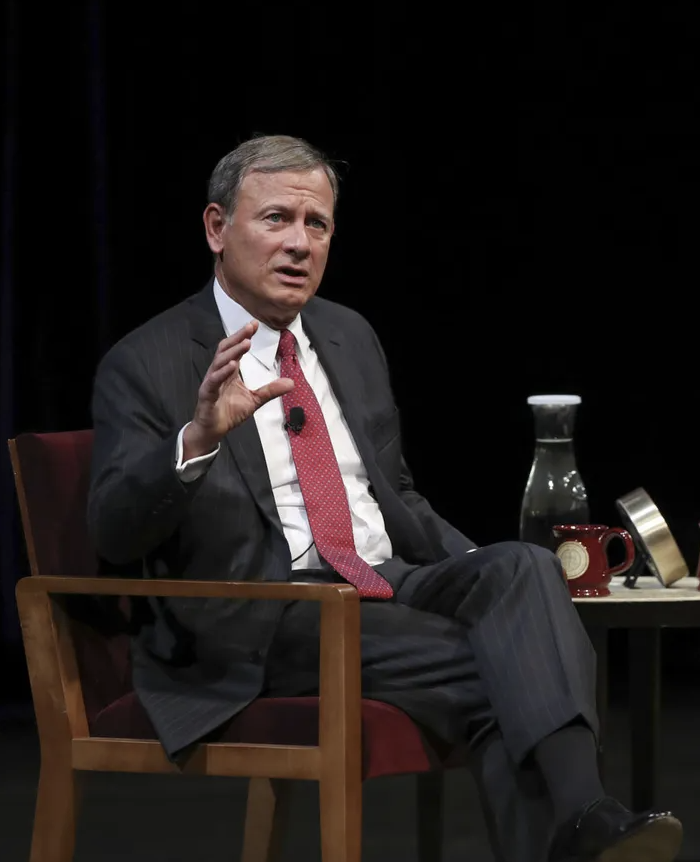John Roberts Accepts No Large Gifts, Writes No Books and Has No Billionaire Buddies (That We Know Of)
 What if every Supreme Court justice followed the Roberts method and didn’t accept a bunch of free trips, participate in Operation Higher Court or join what appears to be SCOTUS’s billionaire buddy program?
What if every Supreme Court justice followed the Roberts method and didn’t accept a bunch of free trips, participate in Operation Higher Court or join what appears to be SCOTUS’s billionaire buddy program?
Would the Court be better off? Of course it would be.
We won’t speculate here as to why that’s not the case, but we will take the Chief Justice’s most recent disclosures and compare them to the disclosures of the other justices as a way to show that SCOTUS could, in significant ways, clean up its act on its own.
Section 1: Positions
Roberts is not on any boards (yes, he’s the Chancellor of the Smithsonian Board of Regents, but that’s both obvious and non-reportable) that might get him in trouble ethically.
Compare that to Justice Thomas, who, as an honorary member of the Board of Directors of the Horatio Alger Association, attended an event with, and took a picture with, Alger Association honoree Herschel Walker less than two months before Walker’s Senate primary in Georgia — a photo that Walker’s campaign staff tweeted out.
Section 2: Agreements
Roberts does not have any agreements with past, current or future employers. Compare that to Justice Kavanaugh, who lists agreements with both George Mason and Notre Dame Law Schools. There’s nothing wrong with the justices teaching, of course, and they should get out and offer their insights to law students; instead, FTC has long advocated for the justices not to always teach at their ideological home teams. (When Roberts has taught in the past it’s typically been at the generally apolitical New England School of Law.)
Section 3: Non-investment income
Roberts has never written a book, so, unlike Justices Sotomayor and Gorsuch, he won’t have the opportunity to miss a recusal when their book publisher is a party in a SCOTUS petition. (Justices Thomas, Barrett and Jackson have all written or are writing books, but there hasn’t been the same non-recusal issue for them.)
In terms of spousal income, FTC’s position is that if a spouse is making a significant amount of money from a single source — e.g., via lobbying contract or commission — that should be listed, and Roberts, along with Justices Thomas, Barrett and Jackson should be required to give more information about spousal income on disclosures.
Section 4: Reimbursements
On Roberts’ last 10 disclosures (2013-2022), he has listed only 12 reimbursements. It’s not as if he hasn’t traveled; he and his family go to their Hupper Island, Maine, home each summer and there have been reported ski trips in the winter. Compare that to, say, Justice Breyer, who in that time took 91 reimbursed trips (trips listed here via OpenSecrets and FTC intern Zach Klein).
In short, every justice is taking more free trips than the Chief.
Section 5: Gifts
Roberts has listed very few gifts since joining the high court — just a handful of honorary memberships at club, which he hasn’t used, save for a dinner; opera tickets; and an “inscribed” football helmet from Mississippi judges in 2017 valued at $579. He did get a $200 blanket for giving a 2018 at the University of Minnesota but didn’t report it since it was below the reporting threshold.
Compare that to the largesse received by Justice Thomas over the years — a portrait of the justice and Ginni, a Lincoln bust, a Douglass bust, a Douglass bible, tuition for his grandnephew, car (or RV) tires, car (or RV) batteries; the list goes on.
Also note that some of the gifts the justices have received — reportable or not — were from conservative donors to the Supreme Court Historical Society, likely via Operation Higher Court, or through a billionaire buddy program (e.g., the Justices Scalia and Alito trips to Alaska and the Justice Thomas trips seemingly everywhere else). Note that although Roberts, with a few important exceptions, votes in just as conservative a manner as the others, he has not participated in these programs nor availed himself of these perks.
Section 6: Debts
Roberts does not lists any debts on his disclosures, and — sorry, baseball fans — there’s never been any proven malfeasance with any of the other justices’ debts over the years.
Section 7: Investments and trusts
Roberts is one of only two justices to own stocks, but compare that to other, Justice Alito, who owns shares in 28 companies, which has caused three dozen cert.-stage recusals in the last two years (2022-23) alone.
Though ownership in individual stocks often leads to recusal, we believe that Roberts’ ownership of Schwab funds prompted his recusal in a petition at the Court last year. Justice Jackson owns similar funds but oddly did not recuse.
Additionally, note that when the ownership structure of the Roberts’ family cottage in Ireland was changed in 2021 to the Irish equivalent of an LLC, Roberts listed out what “Caraheen Partners” was (“1/8 int cottage, Knocklong, County Limerick, Ireland”). Compare that to Justice Gorsuch, who, when he owned it, did not refer to his stake in Walden Group LLC as being his one-fourth share of a Colorado lodge.